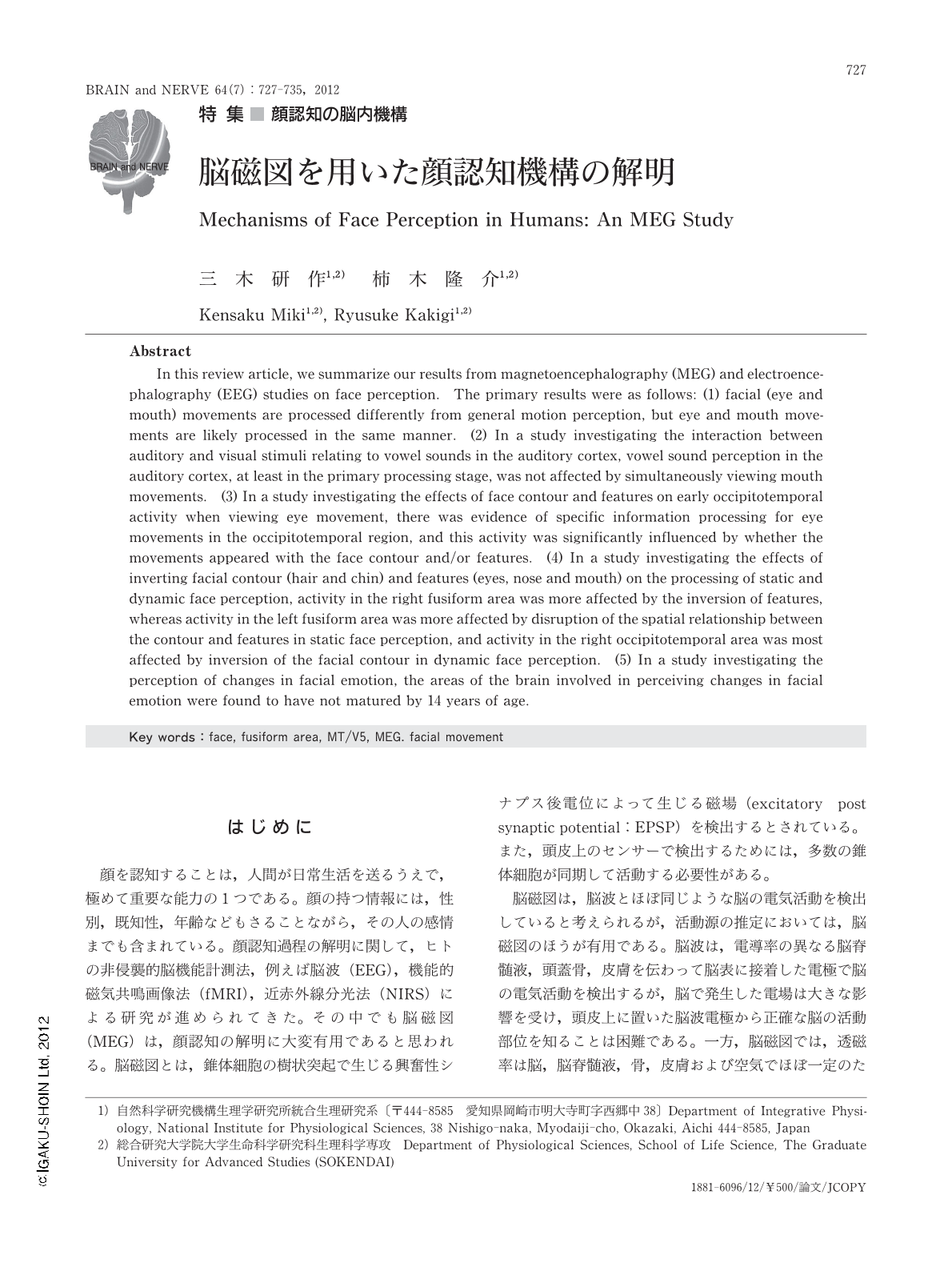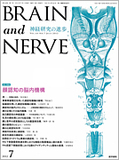Japanese
English
- 有料閲覧
- Abstract 文献概要
- 1ページ目 Look Inside
- 参考文献 Reference
はじめに
顔を認知することは,人間が日常生活を送るうえで,極めて重要な能力の1つである。顔の持つ情報には,性別,既知性,年齢などもさることながら,その人の感情までも含まれている。顔認知過程の解明に関して,ヒトの非侵襲的脳機能計測法,例えば脳波(EEG),機能的磁気共鳴画像法(fMRI),近赤外線分光法(NIRS)による研究が進められてきた。その中でも脳磁図(MEG)は,顔認知の解明に大変有用であると思われる。脳磁図とは,錐体細胞の樹状突起で生じる興奮性シナプス後電位によって生じる磁場(excitatory post synaptic potential:EPSP)を検出するとされている。また,頭皮上のセンサーで検出するためには,多数の錐体細胞が同期して活動する必要性がある。
脳磁図は,脳波とほぼ同じような脳の電気活動を検出していると考えられるが,活動源の推定においては,脳磁図のほうが有用である。脳波は,電導率の異なる脳脊髄液,頭蓋骨,皮膚を伝わって脳表に接着した電極で脳の電気活動を検出するが,脳で発生した電場は大きな影響を受け,頭皮上に置いた脳波電極から正確な脳の活動部位を知ることは困難である。一方,脳磁図では,透磁率は脳,脳脊髄液,骨,皮膚および空気でほぼ一定のため,発生した磁場はほとんど影響を受けず,より高い精度で活動源が推定できる。また,脳磁図は,血流変化を計測するfMRIやNIRSに比べ,時間分解能に優れている。私たちの研究室ではこの時間分解能,空間分解能に優れた脳磁図を用いて各種感覚の認知過程を解明してきた。また,その一環として顔認知過程の解明に関する研究も行ってきた。
Watanabeらは開眼顔,閉眼顔,目だけ,手,無意味図形の5種類の視覚刺激に対する脳反応を,脳磁図を用いて解析した1,2)。刺激提示後約100~120msecに,まず後頭葉の第1次視覚野に活動がみられた。この活動はどのような視覚刺激に対しても反応するものであった。次に顔あるいは目だけの刺激に対してのみ,刺激提示後約150~170msecで側頭葉下面の紡錘状回の活動がみられた。このような詳細な活動場所とその時間的経過の検討ができることが,脳磁図の最大の長所である。開眼顔と閉眼顔に対する反応の間に有意な差はみられなかったが,目だけの画像に対する反応時間(潜時)は顔全体の画像に対する反応時間よりも延長していた。これは,顔認知の初期には各部分の認知よりも「全体として顔であるかどうか」の認知のほうが重要であることを示唆している2)。
本稿では,筆者らが今まで行ってきた以下の研究を紹介させていただく3-7)。①顔の動きの認知に関連する脳活動,②口の動き認知による音声に対する初期聴覚野の活動への影響,③目の動きを認知するときの輪郭やパーツの影響,④輪郭や内部のパーツが倒立した際の顔認知への影響,⑤表情変化に対する誘発脳波の発達による変化。
Abstract
In this review article,we summarize our results from magnetoencephalography (MEG) and electroencephalography (EEG) studies on face perception. The primary results were as follows: (1) facial (eye and mouth) movements are processed differently from general motion perception,but eye and mouth movements are likely processed in the same manner. (2) In a study investigating the interaction between auditory and visual stimuli relating to vowel sounds in the auditory cortex,vowel sound perception in the auditory cortex,at least in the primary processing stage,was not affected by simultaneously viewing mouth movements. (3) In a study investigating the effects of face contour and features on early occipitotemporal activity when viewing eye movement,there was evidence of specific information processing for eye movements in the occipitotemporal region,and this activity was significantly influenced by whether the movements appeared with the face contour and/or features. (4) In a study investigating the effects of inverting facial contour (hair and chin) and features (eyes,nose and mouth) on the processing of static and dynamic face perception,activity in the right fusiform area was more affected by the inversion of features,whereas activity in the left fusiform area was more affected by disruption of the spatial relationship between the contour and features in static face perception,and activity in the right occipitotemporal area was most affected by inversion of the facial contour in dynamic face perception. (5) In a study investigating the perception of changes in facial emotion,the areas of the brain involved in perceiving changes in facial emotion were found to have not matured by 14 years of age.

Copyright © 2012, Igaku-Shoin Ltd. All rights reserved.


